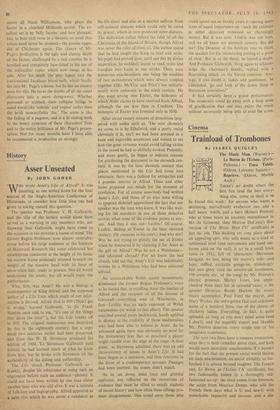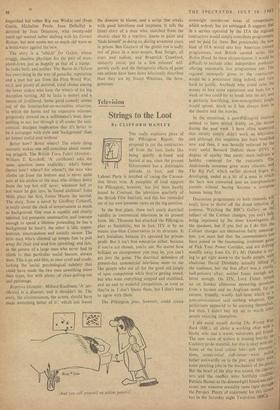Cinema
Trainload of Trombones
By ISABEL QUIGLEY The Music Man. (Warner.)— THERE'S no doubt where the best fun (and the best every- thing else, come to that) is to be found this week: for anyone who wants a deafening, marvellously exuberant two and a half hours' worth, and a hero (Robert Preston) who at times bears an uncanny resemblance to Mr. Jo Grimond, then Morton DaCosta's film version of The Music Man ('U' certificate) is just the job. This dashing yet cosy piece about an appealing spiv, who sells music at a kind of subliminal level (and instruments and band uni- forms paid on the nail), is set in a small Iowa town in 1912, full of `characters'—Hermione Gingold, no less, being the mayor's wife—and busy, ruffled, excitable goings-on, transmogri- fied into glory (and the seventy-six trombones, 110 cornets, etc., of the song) by Mr. Preston's electric presence. Shirley Jones, less apple- cheeked these days but in splendid voice, is the spinster librarian, Buddy Hackett the music man's accomplice, Paul Ford the mayor, and Mary Wickes, the unforgotten face and unknown name of a hundred films, one of the chorus of clackerty ladies. Everything, in fact, is quite splendid, so long as you don't mind noise (and I don't), and the superbly expert and likeable Mr. Preston deserves every single one of his imaginary trombones.
he next two films have a tenuous connection, since they're both comedies about class, and both would seem incredibly anachronistic if it weren't for the fact that our present social world thrives on such anachronism, on social triviality so far- fetched it is almost beyond laughter. The French one, Le Baron de l'Ecluse ('A' certificate), has two fashionable names in a thoroughly old- fashioned set-up: the story comes from Simenon, the script from Maurice Druon, who tells the French these days what is IJ and non-U with remarkable loquacity and success; and a dis-
tinguished but rather Rip van Winkle cast (Jean Gabin, Micheline Presle, Jean DeSailly) is directed by Jean Delannoy, who twenty-odd years ago seemed rather dashing with his Eternel Retour, but now seems not so much old wave as a breakwater against the new.
The story is a 'vehicle' for Gabin, whose craggy, classless physique fits the part of man- about-town just as happily as that of a tramp: he looks both, and neither. The Baron de l'Ecluse has everything in the way of panache, reputation and a past (air ace from the First World War, etc.), and plenty of devoted, loyal chums among the lower orders who keep the wheels of his big deception turning. All he lacks is money and a means of livelihood. Some good comedy conies out of the luxuries-but-no-necessities situation, in which the baron and his expensive mistress, gorgeously dressed on a millionaire's boat, have nothing to eat; but through it all comes the anti- comical, deadpan implication that it's better to be a scrounger with style and 'background' than an honest useful soul without.
Better how? Better where? The whole thing instantly makes one self-conscious about sound- ing priggish. The British Tiara Tahiti (director: William T. Kotcheff; 'A' certificate) asks the same question more explicitly: who's better (better how? where? for whom?), the man who climbs up from the bottom and is never quite sure of his aitches or the man who slithers down from the top but will never, whatever hell or hot water he gets into, be found aitchless? John Mills plays the first, James Mason the second. The story, from a novel by Geoffrey Cotterell, is really about the clash of temperament as much as background. One man is capable and clearly talented, but pompous, unattractive, and insecure enough to spend a lifetime pretending he has a background he hasn't; the other is idle, unpre- tentious, unscrupulous and socially secure. The little man who's climbed up tempts fate to pull away the chair and send him sprawling; and fate, in the person of a large man who never had to climb to that particular social heaven, always does. This is an odd film, at once cruel and crude, lacking the 'social psychological subtlety that could have made the two men something more than types, but with plenty of chair-pulling-out and patronage.
Reprieve (director : Millard Kaufman; 'A' cer- tificate) is a disaster, and it shouldn't be. The story, the circumstances, the actors, should have made something better of it: which just leaves the director to blame, and a script that creaks with good intentions and ineptness. It tells the (true) story of a man who, snatched from the electric chair by a reprieve, learns to paint and 'finds himself' in doing so, during seventeen years in prison. Ben Gazzara of the gimlet eye is sadly out of place in a near-weepie, Rod Steiger, all scars and sadism, and Broderick Crawford, sinisterly jovial, put in a few minutes' self- parody each; and the therapeutic effects of paint can seldom have been more hilariously described than they are by Stuart Whitman, the hero- governor.



































 Previous page
Previous page